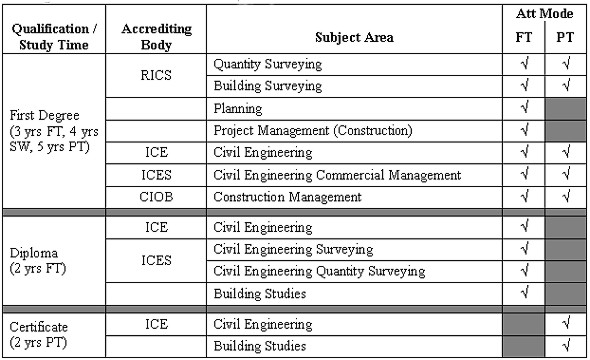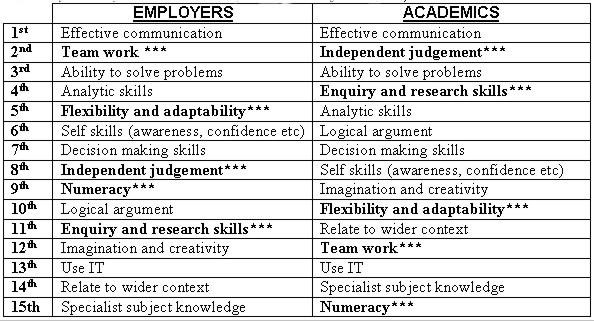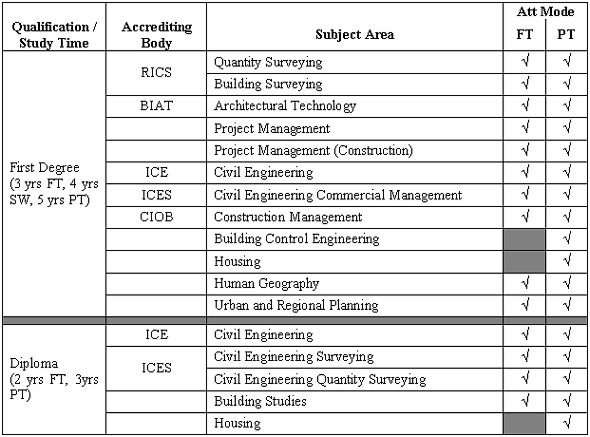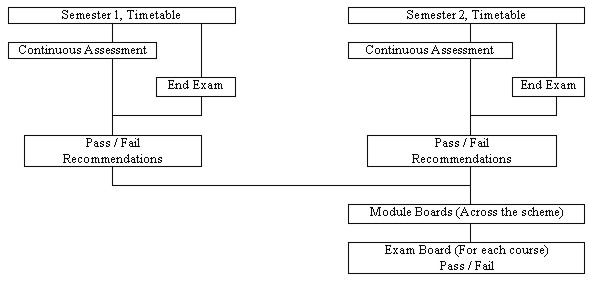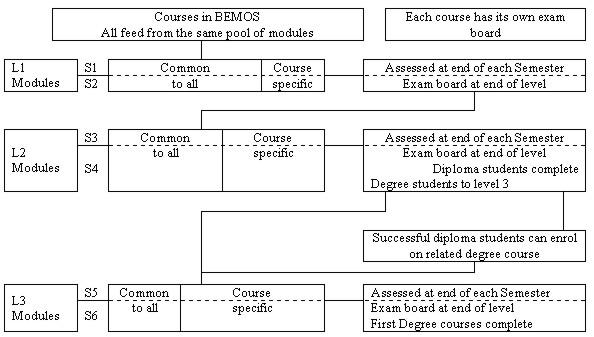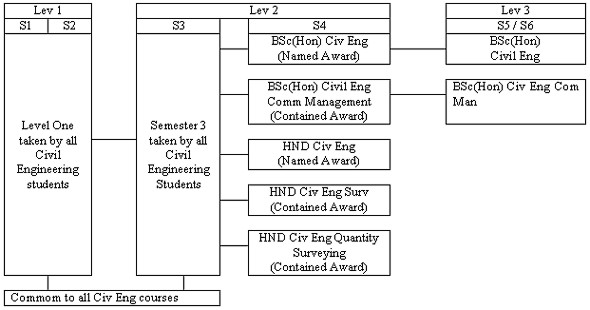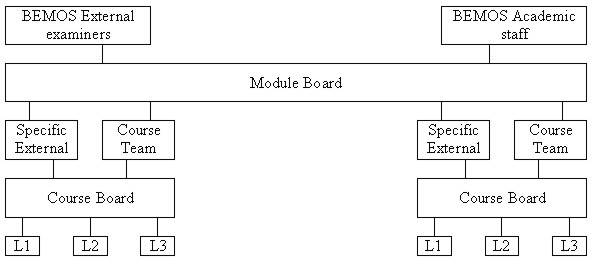THE DEVELOPMENT AND EVOLUTION OF THE BUILT ENVIRONMENT MODULAR SCHEME (BEMOS) AT LEEDS METROPOLITAN UNIVERSITYDavid Graham RODGERS, United KingdomKey words: Modular, Scheme, Undergraduate, Surveying, Environment. 1. THE BACKGROUNDIn 1996 the School of the Built Environment at Leeds Metropolitan University ran undergraduate courses in the following subject areas:
The majority of which are represented in some form within the FIG movement. The total number of Modules in these courses numbered nearly 200, and all cohorts were taught individually. Many of the courses had less than 20 students per level and dedicated electives at levels 2 and 3. In recent years the UK government has expanded the UK Higher Education sector without a corresponding increase in the level of funding. "A generation ago only about 10% of young people attended university, now 40% of young people aged between 18 and 30 participate in higher education courses. The Government hopes to increase this proportion to 50%. This increase in student numbers has been accompanied by 38% fall in resources per student over the last 12 years on top of a 20% fall in the previous 13 years". (Guardian Newspaper) Additionally the traditional UK policy of paying a students course fees and providing a maintenance grant to cover living expenses is no longer operational. Students now have to pay a proportion of tuition fees and provide their own living expenses. Courses in the School of the Built Environment are of a vocational nature with great emphasis being placed on professional body accreditation. To retain this accreditation we have to respond to changes within the relevant industry. In recent years several reports have been published (Latham 1994, Egan 1998) claiming that graduates from Built Environment type courses have little knowledge of discipline's other than their own, have poor communication skills and are not confident with IT. Education and quality are inextricably interlinked. " quality will not improve and costs will not reduce until the industry educates its workforce not only in the skills required but in the culture of teamwork."(Para 56, Rethinking Construction) If the School of the Built Environment was to survive we had to respond to these events and criticisms. 2. THE RESPONSEThe decrease in the unit of funding has forced the University to look at ways of reducing costs. After looking at the course programme within the School of the Built Environment it was obvious that many courses were effectively running the same modules but with different titles. By examining the content of similar modules delivered to each cohort within the school it was very often possible to replace 3 or 4 with a single common module. Elective modules chosen by just 2 or 3 students were deemed to be uneconomical and discontinued. Through this rationalisation process the original 200 modules were reduced to 83 without any corresponding reduction in the number of accredited courses. While reducing the module count and redesigning the courses we were aware that we must not lose sight of the requirements of industry. The following table shows the main qualities that employers are actually looking for and those that academics believe they are looking for, the main disagreements are highlighted: (Employer Satisfaction: Interim Report, QHE Project Report)
The result of this rationalising and restructuring is the Built Environment Modular Scheme (BEMOS). A "Scheme" has been defined by the HEQC as:
HEQC, 1997, p8 Currently the scheme offers the following awards, 2 of which are accredited by the Royal Institute of Chartered Surveyors (RICS) and 3 by the Institution of Civil Engineering Surveyors (ICES). The RICS and ICES being the two UK professional bodies within FIG.
The BEMOS scheme is designed around a two semester year. Each semester is made up of 4 modules and to minimise costs the maximum amount of commonality is achieved. From a financial point of view this works well, allowing courses to be run that would not be financially viable if the cohort was taught by itself. It also facilitates student movement around BEMOS courses in the early part of level 1. Unfortunately courses tend to lose their individual identity and this can be unsettling for new students, i.e. Quantity Surveying students cannot understand why they are being taught alongside Civil Engineering students. TWO SEMESTER MODEL
DIAGRAM OF THE BEMOS SCHEME
If a students academic qualifications at the time of application are not of a standard that will allow entry onto a degree course they can normally be enrolled on a diploma. Upon successful completion of the diploma they can progress onto the final level of a relevant degree course, though completion may take 3 semesters. Within the scheme courses can have contained awards embedded within them. The Civil Engineering courses are made up of two named awards, the BSc (Hons) Civil Engineering and the HND Civil Engineering plus an additional 3 contained awards, with the first 3 semesters being common to each course. The student does not have to decide his final route until the end of the third semester. CIVIL ENGINEERING ROUTES WITHIN BEMOS
Two influential reports were published in the UK in the 1990's, (Constructing The Team, Latham 1994 and Rethinking Construction, Egan 1998) highlighting several perceived deficiencies within the skills base of the construction related industries. The main ones being:
The BEMOS scheme attempts to address these deficiencies by placing great emphasis on the development of Inter - disciplinary working and transferable skills. Each of the 3 levels has a specific module that requires students to work closely with those on other courses.
These modules are designed to make students aware of common objectives, develop an appreciation and understanding of the different roles played by people working within the Built Environment, and encouraging communication and team building skills. Within these modules we are specifically attempting to develop the following transferable skills:
The remaining transferable skills are developed within the other modules:
3. THE PROBLEMSFrom the staffs point of view course and module ownership is no longer clearly defined. In the past the learning outcomes of a specific module have been developed for a specific course. Modules for a Civil Engineering course would have a different feel than those for a Quantity Surveying or Planning course. In a large modular scheme a specific module may have to satisfy several routes through the scheme. The learning outcomes will be less specific than for a module dedicated to a specific route. There is a feeling within the academic community that the drive for commonality is watering down the technical content of the modules. However industry, the people who purchase our final product, do not perceive it as a problem. They value communication skills and the ability to work in a team above specialist subject knowledge. The drive to a mass higher education system has led to a large increase in student numbers from families with no experience of higher education. Very often their families can give no financial help and are unable to empathise with the problems their student offspring are experiencing because they have not been through it themselves. These types of problem frequently lead to high attrition rates, which in turn exacerbate the funding problems of the University. The BEMOS scheme is attempting to minimise these problems by seeking out and addressing the root causes of high student attrition. Many UK Universities now organise the academic year around two 15 week Semesters, with modules being taught and assessed within a single semester. The majority of level one students are coming from an educational system based on three terms, with each subject being taught and assessed over the full academic year. TRADITIONAL 3 TERM MODEL
It is apparent that students do not realise the importance of this fundamental change in the structure of the academic year until they reach the first set of critical assessments at the end of semester 1, and then it may be too late. The assessment pattern for a module can follow one of three modes:
When the assessment is coursework only there may be one or there may be multiple pieces of work making up that assessment. If there is only one item success hinges on the quality of that single piece of work. Level one student's are not used to critical assessments taking place at the end of January and they fail to realise the consequences. University regulations specify a maximum number of modules that can be carried over between levels. Students can exceed these limits in the assessment that occurs at the end of semester 1 thus leaving no room for error in semester 2. The School is changing the pattern of assessment that takes place at the end of semester 1 and discouraging any assessment that is based on a single item of work. A feature of the BEMOS scheme is the group / interdisciplinary work. It has become apparent that the introduction of these modes of working is not straightforward. The module that introduces all level 1 BEMOS students to the concept of interdisciplinary work is called "Contemporary Issues in the Built Environment". Amongst other things the module aims "To provide students with an understanding of the social, economic, and environmental contexts within which development takes place and to examine the roles of the different actors and agencies within the development process". The teaching and learning strategies used to achieve this are "A lecture series supported by tutorials covering key issues, roles and skills. Students will be divided into inter-disciplinary groups for the tutorials and to undertake a place - specific case study of issues and processes in the built environment." The module was taken in semester 1 and initially produced a high failure rate. The reason for the high failure rate proved to be social rather than academic in nature. The students were in their first semester at a new University. They found it very hard to establish working relationships with people studying different disciplines than their own. The University is committed to developing inter-disciplinary working, but accepts that it is unfair to expect students to establish working relationships with students on other routes before they have mastered the relationships within their own cohort. As a consequence of this the teaching and learning strategies for this module have been changed and students are no longer split into inter-disciplinary groups at level one. The change in the funding regime has led to the majority of students being in some form of regular employment. This is forcing the realisation that what constitutes a full time student in the 21st century is not the same as in the 20th, the difference between a full time and part time student is rapidly diminishing. In a tacit acceptance of this the timetables within the BEMOS scheme attempt to avoid fragmentation and keep two days a week free so that students can take up some form of paid employment. This seems to send the wrong message to some students, especially those at level 1, who assume that if the timetable indicates they only have to attend lectures on 3 days of the week they only have to do University work on 3 days of the week as well. The effect of this is to make contact with students difficult to maintain. If lectures have to be suddenly changed or a visiting lecturer is arranged at short notice it can be difficult to inform the relevant students. Computer based electronic communications will not solve the problem as very few students have access to e-mail away from the University, perhaps text messaging via mobile phones may provide a solution. Initially level one students felt lost within BEMOS, experiencing difficulty in developing loyalty to a course that is just one of many possible routes through. A timetabled "Professional Development" module has now been developed for each route providing a platform for visiting speakers, site visits, specialist lectures, etc, and a focal point that helps to create a group dynamic. The concept of module ownership has clearly changed under BEMOS. Under the old system a module was developed for a specific course with ownership effectively held jointly by the course and the module leader. Within BEMOS the module leader and BEMOS own each module within the scheme jointly. The course team decide which modules are to be taken by their course and construct the timetable in such a way that their students can attend the required lectures / tutorials. In some routes a module may be of crucial importance in others it may be on the periphery, but the module will be taught and assessed in exactly the same way to all routes. Within the UK different subject areas are funded by the Government at different rates. Civil Engineering related modules within the BEMOS scheme are funded at a higher rate than other subject areas. A modules importance may be judged by its financial rate of return rather than its intrinsic value to a particular route through the scheme. The success of BEMOS will be measured by its acceptance within the professions and industry. External examiners are appointed to ensure that assessment across all modules is fair, competent and to the same standard. Module results are passed to the examination boards of the courses that make up the scheme and here the externals ensure that the students are treated equitably and within the University regulations. ORGANISATION OF MODULE / EXAM BOARDS
The problem here was in the organization of the Module Boards. External examiners are normally appointed because of their links with accrediting professional bodies, industry or academic reputation. Their appointment is course and not module specific. One course might consider a module to be very important and another may consider that it provides little more than peripheral knowledge. The external examiners must be made aware that they now have two rolls to play:
4. CONCLUSIONThe Built Environment Modular Scheme is successfully changing the nature of the undergraduate courses within the School of the Built Environment at Leeds Metropolitan University. Technical skills are no longer the prime requirement, students must have the ability to communicate and work within a team. Initially the BEMOS scheme had many faults, most of these becoming very obvious very quickly:
The School of the Built Environment at Leeds Metropolitan University is making every effort to address these problems. Industry and the Professional bodies are very supportive of the BEMOS scheme and are happy with the product that we are producing. The Royal Institute of Chartered Surveyors has recently entered into a "Partnership Agreement" with the University based on courses within the scheme. REFERENCESEdwards, J, 2000, Managing Large & Complex Schemes, Leeds Metropolitan University Egan, J, 1998, Rethinking Construction, London, HMSO Guardian Leader, February 26, 2001, Guardian Leader, Guardian Harvey, L, 1993, Employer Satisfaction: Interim Report, QHE Project Report, London, HMSO HEQC, 1997, Managing flexible curricula in higher education: the architecture, London, HEQC Latham, M, 1994, Constructing The Team - Final Report of the Government / Industry Review of Procurement and Contractual Arrangements In The UK Construction Industry, London, HMSO BIOGRAPHICAL NOTEDavid Graham Rodgers CONTACTSenior Lecturer David Rodgers 22 April 2001 This page is maintained by the FIG Office. Last revised on 15-03-16. |
